#I also like some of those characters
Explore tagged Tumblr posts
Text
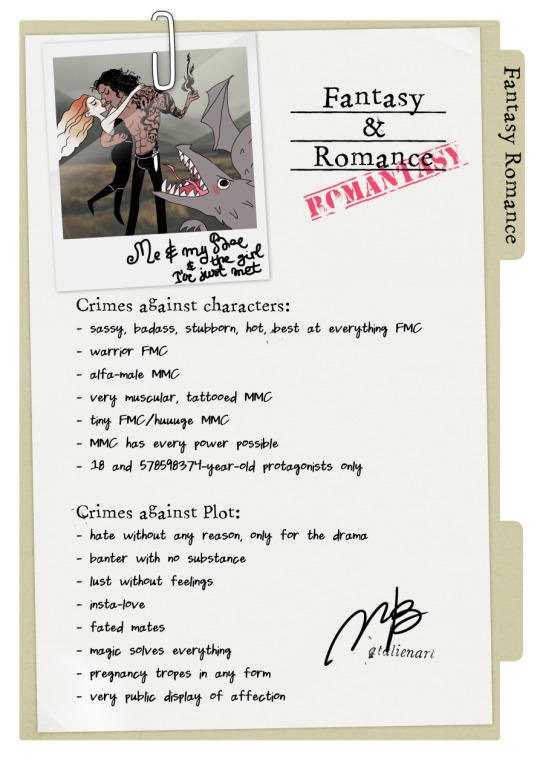

Well... what can I say :|
#my art#jabbernaty#fantasy romance#romantasy#It's half past 2am#It's the only time I would be brave enough to include this little photo and my romantasy complains xD#there's a lot of tropes I don't like in this kind of books and a lot of them align with your dislikes you left under my previous post#thank you for sharing btw!#also#there are fated mates on the list and I also write a story where soulmates exist but hear me out#✨it's different✨#I'm serious#I don't like this trope so I wanted to change things about it xD#anyway... hope it makes sense#oh and the drawing doesn't depict anyone particular#it's just that the characters often look pretty similar#also this is not to be mean#I also like some of those characters
61 notes
·
View notes
Text
main take aways from Halloween (1978) rewatch:
michael myers is canonically 21??? this bitch should be at the club
*sees tiddies* ***MURDEROUS RAMPAGE NOISES***
that's it that's the movie
outside of the fact that everyone who has sex is murdered by the narrative, this is a surprisingly chill portrayal of female sexuality? these teen girls are horny and actively enjoying Getting It On with their boytoys. no pushy boyfriends sneaking in through their bedroom windows--these ladies are taking the initiative to sneak out and GET SOME. one of them gets laid and then immediately orders her boyfriend to get her a beer. (yes she gets Slashered soon afterward, but so does the boyfriend so honestly, gender equality.) yes the Final Girl is the only one not having sex, but she's not bullied for that, nor are her friends slut shamed except possibly by being murdered by the narrative
actually the only character who is shown being morally condemned on-screen is michael myers. specifically FOR his violent overreaction to other people's sex lives. (people he is spying on). metaphorically, the villain is American Puritanism sticking its judgy nose into other people's business.
aka Michael Myers Is A Republican
but actually the real villain is the doctor. guy's a judgemental, shaming, pathologizing asshole. and he's been in charge of michael's care since he was SIX YEARS OLD? kid never had a chance. i'd go on a killing spree too
also the parents. where are the parents? it's halloween night and all the teenage girls are home babysitting their younger siblings? come to think of it, michael's first victim was his own older sister, whom he killed while she was babysitting him. teen girls are really shouldering a labour burden here. maybe parentification is the true villain
side note: mike commits his first murder wearing a clown costume...which is never referenced again? his 'iconic' costume is a generic mask and wig and jumpsuit, when we coulda had a Killer Clown Michael Myers??? travesty
i like how the Final Girl and her friend casually smoke weed in her car. yeah she's an honor student and her friend is the sheriff's daughter. yeah they smoke weed. so what it's 1978
(to reiterate, mike is 21 and should be at the club. im not saying he shouldn't be rampaging, im saying it's sad that he broke out, tasted freedom for the first time in his life, and immediately snuck back into his childhood home to go rampaging. let's have a remake where he goes to a nightclub and has a few beers. maybe some slutty dancing. then rampage)
oh no he's hot


#HALLOWEEN#halloween the movie#michael myers#do you think he's a mike? mikey? to his friends? if slashers had friends?#i'll be honest i was expecting this movie to be way more of a bitch to its female characters#i mean yeah they died but so did some dudes#there's just a lack of cattiness compared to the way most later movies portrayed teenage girls idk#yeah the Final Girl is a Virgin and a Bookworm. but there's no bullying or any strong sense that's she's morally superior to everyone else#mostly she AND the other girls feel a bit sorry for her lack of a social life. one even tries to set her up with a date to the school dance#solidarity! trying to get your nerd friend laid!#overall it's just teenagers being teenagers and then a slasher comes in and ruins everything with his Lack Of Chill#like yeah dude sometimes teenagers have sex. get over it#also something to be said about how while the girl who survives is the one who isn't sexually active and dresses conservatively...#ultimately those things aren't ENOUGH to prevent her from being targeted#you could say that the other girls 'provoked' the villain (the same way women irl are so often accused of provoking their attackers)#but ultimately that doesn't keep the Final Girl safe. it just delays the inevitable.#because violent men never need excuses. no matter how eager society is to provide them.#ultimately she is at the mercy of the same violent whims because it was never her behavior that invited the violence.#gendered violence doesn't need an invitation.#also she doesn't save herself the doctor saves her#it's not her actions or choices that put her in danger OR save her from it--once again it is the whim of a man#no this wasn't intended to be a feminist movie it's just fun how you could argue it that way
4K notes
·
View notes
Text
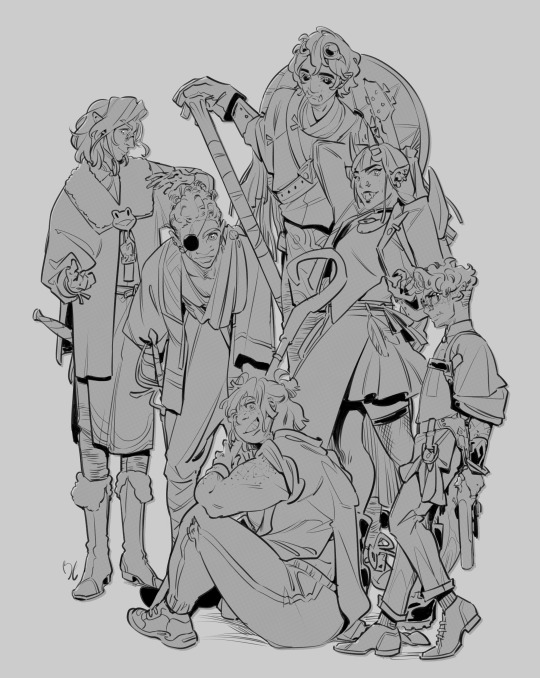
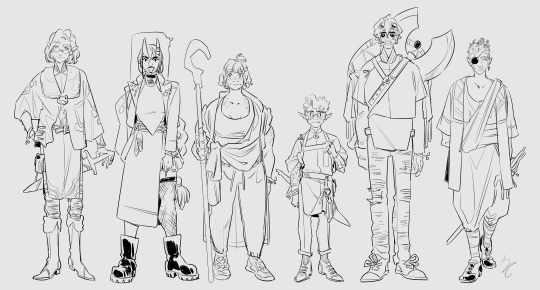
truly this one's just for me. I can do what I want foreverrr
#dimension 20#fantasy high junior year#adaine abernant#figueroth faeth#kristen applebees#riz gukgak#gorgug thistlespring#fabian seacaster#việt phục#tbh the thing Im the proudest of in these sets is the skirt hike+áo tấc flap combo. and of course that went to riz lol#will use that again for other things later down the line. for now we play dressup. come play dressup game with me#some of these couldve done with more cookin time maybe... I feel like. for example adaine's gorgug's and fabian's silhouettes are#a bit too similar for my taste#esp. adaine and gorgug. fabian I feel like I just need to make his waist more apparent#and I really like what Ive got with adaine rn... just gotta rethink gorgug#lmao. the dilemma with using áo tấc is it's generally a rectangle#this never stops me however. if I like a guy enough I Will give them a set#it's not about them it's about me. its for me babeyy#also I love the way scabbards are worn in wuxia. like its just dangling back there#guess the amount of fabrics those characters have on mostly immobilize it. just a real good cushion
4K notes
·
View notes
Text


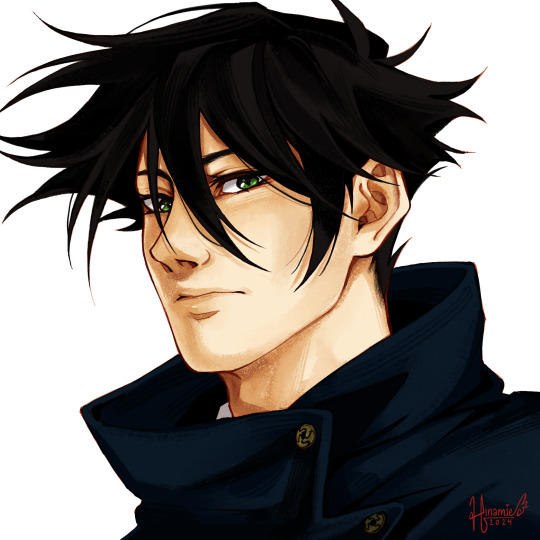


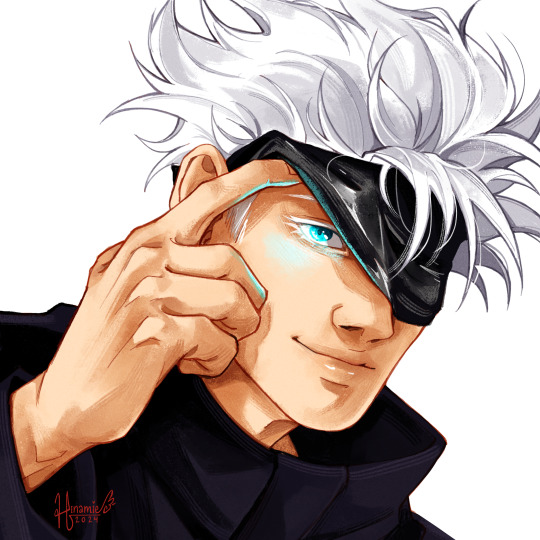


bunch of portraits
#my art#jujutsu kaisen#jjk#jjk fanart#jujutsu kaisen fanart#yuji itadori#ryomen sukuna#megumi fushiguro#gojo satoru#nanami kento#choso kamo#nobara kugisaki#yuta okkotsu#fanart#crying im so tired....#busts aren't hard on their own but 8 of them ???#i should have stuck at 6 if i knew what was good fr me#but lucky fr choso n yuuta enjoyers i dont know whats good fr me and tacked on the extra 2 last minute#i did a bust piece waaay back in 2020 early jjk days and it was this crowd minus choso/yuuta so i wanted to like. do a kind of redraw#im happy choso n yuuta made the cut tho they r fun they look as tired as i feel#i've been having a lot of fun w the more semirealistic skin render so i wanted to stretch those muscles a bit more#took the better part of 3 days but u know i'm pretty happy w these i dont think i have a hard least favourite#fun game guess my favourite characters based on how i draw them it is Glaringly obvious 2 me#ik i said i dont have a least favourite but i certainly have A Favourite#uhhhh misc notes i tried rly hard to make sukuna's face look like yuuji's and only rly change the expression#i think i was successful??? i hope?????? like i didnt want to make him look like his own person as bad as that sounds#he is Wearing Yuuji that is Yuuji's Face#also i rly . wish there were more women . but as much as i like maki as a character i fr some reason don't find drawing her very fun ?#so nobara out here pulling her weight fr the girls my goat my queen <333
2K notes
·
View notes
Text
sad: falling out of a hyperfixation
tragic: watching your beloved friends and mutuals fall out of the hyperfixation while you're still in it
#oughhhhhhh#this is about the dca fandom but also about every other strong fixation ive had over the years lol#i know it's normal and inevitable esp for less popular works or minor characters with little canon content#and there's nothing wrong with smaller communities of course those rock#but there’s just something special about getting into something at the same time as a lot of other people all at once#and existing in this chaotic fandom space that's just bursting with creativity and passion#i've been in fandom spaces for as long as some of you have been alive and i've only come across that sort of unbridled joy like#a handful of times at best#it's just a heartbreaking feeling to see real lightning in a jar fandoms like that wither away as people drift away#(understandably so!)#anyway don't mind me i'm just having thoughts#musing about fandoms past as well#that i too eventually moved on from but remember fondly even if im not active in anymore#also my music just aint hitting right so im just sitting in silence which makes me more Contemplative(tm)
8K notes
·
View notes
Text


This is your protagonist, everyone. This is the man sap that we’re supposed to cheer for.
#disney fnaf#disney michael afton#michael afton#this michael would unironically say stuff like “dont sweat it pops”#fnaf#fnaf fanart#laddersarts#artists on tumblr#i keep thinking about how an actual disney-esque fnaf movie would go (bc ive been picturing some animated sequences) and-#one obvious starting point is that michael would be the protag. i also realized that i never actually made a proper michael design-#before so this was a bit of an experiment on what I think he could look like.#ive also-also kind of realized i should tag characters individually with “disney [name]” bc i notice that its a common question about-#whether ive drawn a stylized version of a specific character or not. so since i already tag “disney fnaf” bc thats the main inspo and style#that im going for i figured that it could be an easy way to see if ive drawn a stylized version of a certain character by checking if i-#have something tagged with them (especially since ive been planning on doing some more of those stylizations to other characters recently)
447 notes
·
View notes
Note
LUO BINGHE CASUAL SENSHI COSPLAYER

OH, ABSOLUTELY.
(context)
#poorly drawn svsss#svsss#modern au#luo binghe#shen qingqiu#okay technically shen yuan because this is a modern au but I don't have a separate tag for the two.#Casual cosplayers are the worlds strongest fans. You vibe with a series/character so much that you take on their style into daily life.#For every person that learned better self care with Dungeon Meshi there is someone who learned they were into hot bears because of senshi#I also know there are some people who learned they wanted to *be* a hot bear because of senshi - so extra kudos to those folks.#Shen Yuan would love dungeon meshi...Guy who can't cook but would still buy the limited time kitchen set.#Also I feel like I've leaned too much into the 'LBH pines for SQQ/SY' and neglected the equally true reversal.#They fact they are both obsessed with each other is what makes them so good. SQQ is just more in his head about it.
650 notes
·
View notes
Text
I find the fact that the confrontation at the end of UTRH is often summarized as Jason asking Bruce to kill the Joker for him fascinating.
Because that's not what happened.
Jason holds a gun up to Joker's head, gives Bruce another, and tells him that if Bruce doesn't do something (shoot Jason), he will kill Joker.
Jason doesn't give the gun to Bruce so that he would shoot Joker. He isn't expecting Bruce to pull the trigger on the clown. He's asking Bruce to do nothing. To be inactive. Because that will still be a choice, and despite having done nothing, everybody clearly agrees that Bruce would still, at least in part, be responsible for Joker's death.
...And to me, this moment is a kind of- microcosm, of the rest of Jason's point. Because after being captured and carted off to Arkham, the villain will escape again, and will kill more people. The only way to truly prevent that from happening would be to kill them; Bruce refuses to do so, and I respect his right to choose such a thing for himself, but it is still a choice, and if we agree that Bruce's inaction during the confrontation would leave him at least partly responsible for the Joker's death, then we must also agree that his inaction in permanently preventing the Rogues from killing more people means he is also, partly, responsible for all of those deaths.
#my dc posting#batman#dc#bruce wayne#jason todd#joker#uhh is this like analysis or meta#anyway. to me this is the message that scene sends#if we say bruce doing nothing would mean he assisted in the murder of joker then bruce doing nothing about the villains means he is also#responsible for those deaths#ANYWAY yes b4 you come at me;;#bruce's belief in rehabilitation and that everyone can get better is central to his character#and i love it and no i dont actually think he should kill the rogues or whatever#but the question there is. Are you fine with the future victims your decisions will cause?#Are their lives worth the slim chance any of these people will get better?#batman says yes theyre worth it. red hood says no theyre not.#thats the fundamental moral difference there#its why jason challenges the batman status quo#which is why he cant be harnessed well after his initial return bc comics can never truly escape that status quo#anyway i sure am having some thoughts for someone not that smart so if you disagree please tell me!!! just be civil or ill just block you <#...anyway this is another thing BTAS succeeds in bc i always feel like yes these villains do deserve yet another chance#despite what theyve done. bruce's belief in them doesnt feel stupid and naive#its abt what you yourself can live with. bruce can live w the deaths of the ppl the criminals he doesnt get rid of kill#and jason can live with killing those criminals and preventing further victims
1K notes
·
View notes
Text
I think depictions of Anya being cruel to Curly or drawing out his suffering are artful and chilling but completely miss the point of the story and her character.
I'm not saying she doesn't deserve to have that "I told you so" moment with him but not in something callous or cold. Even if that is how it happened, she'd immediately feel guilty cause at that point she's not tormenting her tormenter or even the person truly at fault. She's doing something cathartic, similar to how Jimmy likely hits Curly to release rage he can't against the rest of the crew. She'd see herself as no different when she'd come back from the moment and see Curly cowering at her. She wants someone to take responsibility but how does being cruel to the defenseless help? Why would she want the power Jimmy has over her over Curly?
The idea of her extending someone else's pain is just so against the struggles she already faces and how she can't even bring herself to cause someone pain even to help them. Her very desire is to release herself from her own suffering and I doubt she'd even fine some sort of guilty release in being cruel to another.
#anya is not a character i see taking agency or indulging in cathartic behaviors#not knowingly like i see her as a character trapped in her head and maybe in the scenario she's cruel to Curly she is envisioning Jimmy#in his place but its not a story about justice or those deserving of punishment and those not like its the opposite of people projecting#their issues on the wrong people and saying things to the wrong people and doing things they shouldn't but anya uniquely falls out of it as#she is subjected to a lot of it but it is also not something she wants to subject another person to like you are doing what Jimmy does and#placing ur rage into another persons and viewing their actions through your eyes like she'd more likely yell at him than do harm or#cause him more pain like at least make it in character#but also she clearly doesn't want to see jimmy or curly in the same light and doesnt because she still repeatedly goes to Curly for comfort#and protection and god there's like concepts that need to be applied to characters individually and then the story as a whole#we can not view the game through only one themed lens less we forget to inspect the compounding factor of Anya is so much more than girl#that needs to be allowed to go off but a woman that simply wants right to be done by her and no more harm like she doesn't want to be aroun#the suffering like idk but some of yall would just benefit from like understanding that people are inherently grey with the capabilities of#black n white thinking or actions#mouthwashing#mouthwashing game#anya mouthwashing#i like her the most but then again i am defensive of all women in media and hate when people change the way the character would take agency#for themselves like yes I want her to tweak out but she just wouldn't and I like seeing realistic depictions of a woman suffering the way#she is like shes not the type at the end of the movie to have a one liner but feel a shallow freedom cause she needs to realistically heal#idk but its just like there is an obbsession forming with making her character her pain and not how she handles and navigates the issue
664 notes
·
View notes
Text
Actual Ultimate Classpecting Guide
For real this time.
Buckle up, this is a really long one. For everything that's posited, I can provide textual evidence; that being said, I'm not going to be including the textual evidence within the essay itself, because it's already long enough as-is. As such, please feel free to ask for clarification or sources on any assertion, and I'll do my best to provide.
Before we begin, there's some things to discuss about how we're going to be approaching classpect in the following essay. In numbered list form for our short attention spans:
1. There is a concept Hussie talks about multiple times in his book commentary, "personality alchemy" - the idea that there are these "platonic ideals" of certain characters, which can be mixed and matched with others, in order to create new characters. The examples he gives are of how Eridan was a proto-Caliborn, how Kanaya has shades of Jade, how Nepeta was a proto-Calliope, and how Sollux and Eridan have shades of Dave in them. Classpecting is fundamentally a form of this personality alchemy:
2. Class describes the character's arc and emotional hurdles, while Aspect describes the character's base personality traits by which this arc is experienced.
3. For example, all three Seers struggle with hubris: Rose's need to be the smartest person in the room led to her being manipulated by Doc Scratch, Terezi's obsession with meting justice led to her engineering a situation where the only option was to kill Vriska, and Kankri's desire to be seen as a spiritual leader amongst his friends led to him furthering their divisions and harming them.
Then, when their pride is shattered, they cope by inflicting willful self-blindness: Rose turns to drinking herself stupid (the opposite of Light's sway over knowledge), Terezi gets down with the clown (the opposite of meting out Mind's justice, as it's a Gamzee W), Kankri goes celibate (Blood L) despite his clear romantic feelings for certain teammates.
4. As for Aspect: note how all three Life players share the personality traits of optimism, stubbornness, and obstinacy. All three Breath players share an immaturity and naïvety, and are quite frankly irresistible to people for some reason. All three Light players share a need for the spotlight and a tendency toward long-windedness and persnicketiness. So on and so forth.
What's interesting is, if you start analyzing characters that share Classes and Aspects, these specific types of similarity crop up over and over - all our Knights struggle with insecurities and facades, both our Bards have a crisis of faith. All three Breath players have an aspect of immaturity and childishness to their characters, and all three Light players are deeply concerned with appearing intelligent and feeling important.
5. As a result, this guide is NOT intended for classpecting real life people, because we are complicated, we contain multitudes, and we don't have arcs. This is primarily an analysis of what Class and Aspect mean in Homestuck based on textual evidence, because I genuinely believe that you can basically figure it out if you read carefully.
6. Duality, and the idea of "equal and opposite," are major themes within Homestuck - Prospit and Derse, Skaia (described as a crucible of birth and creativity) and the Furthest Ring (the literal afterlife). Which classes are involved in an Active/Passive split, and opposing Aspects, are the same way. This is the primary method I used to determine the Active/Passive pairings and opposing Aspects. After all, as Callie describes, both Thieves and Rogues are classes "who steal" - so, too, do I try to unify Classes by a common theme, even if they diverge wildly in how that theme is expressed (as Thieves and Rogues do). In the same way as the opposite of "up" is not "apple," but "down", because "up" and "down" are both fundamentally concerned with relative vertical position, so too can be defined concepts like Breath and Blood, Hope and Rage, Light and Void - as well as the reasoning behind Class pairings like Heir and Page, Maid and Knight, and Seer and Mage.
7. Descriptions for both Class and Aspect are left deliberately vague and up to interpretation within the comic itself, and this is by design: the actual manifestations of an Aspect can vary wildly given the Class, and even individual person, that it's tied to. Calliope even makes note of the fact that, under the right circumstances, someone can manifest effects that appear to be the opposite of their aspect. She's also careful to couch her language in "may" and "can" - because these concepts are intentionally somewhat nebulous and malleable. As such, while this guide certainly lays down what can be gleaned and inferred from the text, do note that Homestuck runs on a soft magic system, and as such, nothing stated is firm, 100%, must-always-be-this-way - just an overview of what we've seen.
8. There is often great overlap between Aspects, Classes, and Classpects - which Calliope herself notes. Heart and Blood are one of the most salient, as they both have a fixation on relationships, and Calliope mentions that under the right circumstances, a Classpect may even be able to manifest what appears to be the opposite of their Aspect. Again, Homestuck operates on a soft magic system, so this is a feature, not a bug.
ASPECT
There's a little less to say about Aspect, not because it's less complicated, but because "base personality traits" are much more nebulous compared to Class's sway over character arc. Still, Aspect represents the fundamental way a character is, and thus, color every interaction that character has. There's a reason Ultimate Selfhood is sought through Aspect, not Class - Aspect is the core of the character's being, what makes that person that person.
That all being said, Class has major sway over how an Aspect manifests, and certain classes can even invert the Aspect and even the character's role in the party. As such, these descriptions must be parsed carefully in relation to Class. Moreover, due to the soft magic system, there is at times overlap between unrelated Aspects, which can also be exacerbated by Class - Heart and Blood being the most obvious in this regard. Still, overall, you'll find the Aspects to be fairly distinct from one another.
Please also note that every Aspect can deal with its literal counterpart by default - Light players can wield lasers, Breath players can wield the breeze, et cetera. Because this kind of goes without saying, and because the non-literal stuff is more interesting to discuss, I'm not really going to go into too much detail about the literal qualities.
Finally, something interesting to note is that nearly every Aspect follows its own Hero's Journey cycle - full actualization for each one usually means reaching around to its opposite Aspect, and taking lessons from them - for example, Breath players need to learn maturity and responsibility, while Blood players need to learn relaxation and whimsy. Thus, an Aspect at its worst manifests in two ways - either a toxic overabundance of the Aspect's worst traits, or such a dearth of the aspect that it begins to resemble its opposite. Only by reaching into the opposite, however, can the player be tempered and reach full maturity - can they become more of who they are.
SPACE / TIME
Space and Time are both concerned with physical reality, goals, and the way one approaches them.
Space is associated with "the big picture" - with recycling, reproduction, and the interconnectivity of all things. The aspect also presides over the enjoyment of the journey over the destination - Space players serve as reminders that the present moment is as important as the end goal. Space is often a more passive Aspect, being the stage upon which the story is set. They're the hosts of the party, and the one who marks the ending.
Its players reflect these tendencies, often being feminine, with penchants for life-giving acts such as gardening. Their personalities tend towards frivolity and silliness, finding it difficult to stay on-topic or bring full gravitas to serious situations. Perhaps a better word would be "distractable;" when the aspect is so concerned with all things in connection with each other, it's easy to lose track of details, and it's easy to enjoy things simply as they come. Space players tend to be kind, patient, and forgiving, which is a strength as much as it is a flaw; it's easy for malicious actors to take advantage of this compassion, or for the Space player to find themselves in a poor situation by being overly permissive. They can easily be painted over by stronger personalities, and tend to struggle with romantic relationships, as they attract many with their kind and giving natures, and few are naturally so considerate of the Space player in turn.
"Passive" is a good word to use; at a toxic overabundance of their Aspect, Space players are trampled underfoot. They become enablers, servants to dark forces, or so lost in their own worlds that they neglect the one they live in. With their Aspect "inverted," a Space player becomes a demon of poor prioritization. Distracting not just themselves from their true purpose, but others, too, the Space player will wreak havoc by overemphasizing unimportant topics and ignoring important tasks. This superficially resembles Time, in that the Space player will become fanatically dedicated to their task, but note that the poor prioritization is still Space-esque at its core.
Still, within this nadir is a valuable lesson: the strength of self-assertion, and the determination to see a goal through. These will allow the Space player to weed their garden, separating good from bad, allowing it to flourish like never before.
Time, in contrast, is associated with "the little things" - with details, minutiae, and processes. Time presides over the struggle toward something greater, the endurance of hardship with an eye on the prize - the destination over the journey. Time players are the ones keeping track of the tasklist, marking off each item as it reaches completion; they are the tireless workers keeping the whole engine running.
Time players, thus, are ones whose lives are marked by struggle. They are highly goal-oriented; in contrast to how Space players can easily move from goal to goal, task to task, Time players feel bound to see things through to the end, finding satisfaction only when they've achieved their desired result - and only until they come across the next goal in their journey. A Time player isn't happy without a goal to work towards, a craft to polish, a prize to win - but this driven nature can easily be its own downfall, as it leaves little room for the player to admit to their own shortcomings, or ask for help from others. Moreover, their focus on minutiae can leave them blinded to the bigger picture, and it's easy for a time player to fall to despair, able to do nothing more but spin their wheels. They're prone to directionless anguish, frustration, and resentment towards the seeming futility of their actions, becoming destructive and defiant even when it doesn't serve them to do so.
At a toxic overabundance of their Aspect, Time players become explosively destructive. The ultimate "goal" of all things is death, with which Time is associated, and accordingly, Time players have a penchant for aligning themselves with futility and entropy, struggling so hard that their thrashing leaves a trail of annihilation in their wake. With their Aspect "inverted," Time players detach entirely - they can become so fed up with struggle that they simply opt to lay their weapons down and let the end take them. It's very easy for them to come to the conclusions that either everything matters, or nothing matters. This superficially resembles Space and its big picture thinking, but note that its framework of struggle, and whether or not a goal needs to be pursued, makes it a Time concern.
But the inherent meaninglessness of existence is, in itself, an important realization to make - that whether or not anything "matters" in the grand scheme, things can still be worth doing, worth caring about, and worth investing in. This realization allows the Time player to attack their goals with renewed vigor and greater clarity, which in turn means that the party becomes an efficient, well-oiled machine.
BREATH / BLOOD
Breath and Blood are both concerned with directionality, interpersonal relationships, and autonomy.
Breath is the Aspect governing freedom, liberty, and independence; it is a force that breaks shackles, clears out social norms, and refutes "the rules," whatever those rules may be. Breath players can't be tied down, whether by physical bonds, societal rules, or even the ineffable forces of the narrative itself. They are leaders of example, pioneers, and trailblazers, opening new paths for their teammates to follow.
Breath players are goofy and gullible, often with hearts full of childlike whimsy, naivety, and even immaturity. They are friendly and well-meaning, fond of simpler things, and easily swayed by others. They approach the world with a sincere and innocent good-naturedness, like a baby animal before it learns to be fearful of danger. Something about this sincerity seems to make Breath players irresistible to others, and they often find themselves the subject of romantic attraction. However, in this childishness is also the great pitfall of many Breath players - their natures are naturally conflict-averse, and egotistical the way a child can be, failing to see beyond themselves. They can be incredibly callous when not considering the consequences of their actions, or the viewpoints of others.
At their worst, Breath players are irresponsible and callous. They'll shirk the consequences of their actions, blaming anybody but themselves, or simply choose not to care who they hurt in order to get what they want. They may even choose to stop making choices for themselves, leading to the "inversion" of their Aspect - a voluntary loss of freedom and independence, derived from an Breath-like aversion to responsibility, which superficially resembles the bondage of Blood.
But if they are able to overcome these tendencies, a Breath player will learn what true responsibility looks like - responsibility for themselves, their choices, and the effect they have on others. Armed with this, a Breath player's ability to break bonds can be focused into a clear force for good, clearing away all obstacles and harmful societal standards, leading the charge into something new and beautiful.
Blood, in sharp contrast, is the aspect that governs bondage, contracts, and interdependence. It is a force that binds. Under Blood's sway are not only romantic entanglements, but familial, friendly, and societal ones as well. This aspect sees overlap with Heart, but the division is this: Heart concerns itself with feelings, and Blood concerns itself with compatibility. Blood players are diplomats, forces that remind us all that we are more similar than we are different, and that that similarity should bring us together when we are on the verge of pulling apart.
Blood players, reflective of their Aspect's association with bonds, tend to be neurotic and obsessive. They have a tendency to over-examine and overthink, constantly fretting over the infinite and infinitesimal variables that influence the shape of society and interpersonal relationships. However, this judgmental nature stems from a deep well of idealism and empathy; Blood players can't help but care about others and wish for the best for them. In a way, this makes them one of the most mature members of the team, being concerned with its overall well-being. Unfortunately, their prowess does not extend inwards, and their assessment of themselves is usually direly incorrect - all the worse because Blood players always feel responsible for those around them. Blood, being the Aspect concerned with interdependence, is the weakest one when all alone.
Thus, it's easy for the Blood player to wind up controlling - desperate to make sure everyone is moving according to their vision, they'll become iron-fisted dictators, with a "my way or the highway" approach to social interactions. It's easy for them to wind up pariahs of their own making, becoming so critical of others, or so adamant about enforcing their own will, that they inadvertantly sever their ties - something that superficially resembles Breath's independence, but is truly a result of Blood's neuroticism.
But with that space and separation can come great clarity. Blood players must learn to relax their grip, and allow people room to breathe - including themselves. Once able to grasp that sometimes bonds must be forged with a soft touch, Blood players' natural empathy shines through, allowing them to build something so much kinder and greater than the sum of its parts.
LIGHT / VOID
Light and Void are both concerned with knowledge, ontology, and "narrative relevance".
Light (as well as its counterpart) are perhaps best understood through the lens of "narrative" - this idea that, of all things that do and don't exist, and all events that do and don't happen, only the ones put to page are "relevant". Thus, Light is associated with knowledge and luck - that is to say, it's associated with the knowable, the objective, and the concrete, and the ability to determine "important" events. Light players have read the book they're participating in, and able to serve as luminary guides from one plot point to another, lighting the lampposts for others to follow.
Light players, naturally, are erudite and educated, possessing keen intellects and cunning minds. They are fond of knowledge itself, of markers of status and prestige - whether that's wealth, the adulation of the masses, or a massive library. They harbor a desire to be important, to be seen, to be acknowledged, and are happiest when they are looked up to. Conversely, they deal poorly with being looked down upon. Their confidence transmutes easily into hubris, and they struggle with having that pride challenged. As such, they tend to be volatile and unpredictable, quick to retaliate against those who threaten their egos, or obsequious to those whose acknowledgement they desire.
Their desire for the limelight can quickly spell disaster - they can become incredibly cruel, harsh, and egotistical in their pursuit of narrative significance. They forget, in their obsession, that they, too, are fallible and flawed, and the inevitable reminder can come very harshly. Light players struggle with moderation, and as such, when they feel shame, they'll often take drastic measures to cope with it - deliberately darkening their own influence or intellects, removing themselves from the "story" entirely - something which superficially resembles Void's penchant for the background, but which is firmly rooted in Light's obsessive need for drama.
But in experimenting with narrative insignificance, Light players can reach an epiphany - in their absence, others may shine, and that can be a wonderful thing. Light players, then, can learn to shine not just for their own sakes, but for the sake of others, allowing them to weave a story even more brilliant than any that can be weaved alone.
Void, in contrast, is the blank spaces between the words. That which is secret, subjective, unknowable - these are Void's domain. It's associated with taboos and hidden things, sexuality and pleasure. It's also associated with the empty canvas - the blank space before creation, and the oblivion to which creation is eventually destined for. Thus, it stands for infinite possibility, though the collapse of those possibilities into a reality removes that reality from Void's domain.
Thus are Void players ever cosigned to the background, though this generally suits them fine. Void players are very self-possessed. Where Light players tend to exaggerate and complicate, Void players are honest and simple, preferring straightforward solutions. They don't tend to think very hard, instead letting intuition and emotion guide them to where they want to be - which makes them one of the more stable personalities on a team. However, this simplistic, feelings-driven approach often leads to pleasure-seeking behavior, poor impulse control, and overindulgence in vice, and from there, to irrelevance, with which Void is so closely interlinked.
Void players are especially prone to vice, and at their worst, will become so drunk on pleasurable activities that they pursue them to the active detriment of the party's goals or the Void player's self-improvement - making them the ultimate irrelevant character. They can also very easily drag others into their mélange, with a forcefulness that resembles Light's illuminating guidance, but which is ultimately rooted in Void's pursuit of personal pleasure.
But there's a lesson to be learned in Light's domain: how to bring themselves into relevance and greatness. A Void player, once they learn to pursue not just personal pleasure, but a greater satisfaction for the collective whole, can drag the Void behind them, kicking and screaming, to where it'll be of use.
MIND / HEART
Mind and Heart are concerned with what it means to be a sentient being, with identity, and with why we do what we do.
Mind is the Aspect associated with logic, rationality, karma, ethics, and justice. To a Mind player, they "are" because they "think". They are keenly aware of the consequences of every action, and well-versed in cognition and behavior, such to the point of manipulating others with ease. Deeply concerned with the "effect" of cause-and-effect, Mind players are always cognizant of debts and credits, where justice is owed and where it has been over-meted, and their subtle machinations culminate, like well-placed dominoes, in grand and explosive finales.
Mind players are schemers - it's in their nature. They have a tendency to view the world as a puzzle or game, with themselves and the people around them as pieces on a board, and set as their standard rules the laws of ethics and karma - owed debts and overhanging credit - guilty and innocent. Mind players are wickedly cunning, and have an high success rate with every scheme they commit themselves to, but the grand downfall of all these tendencies is that they tend to lack in a sense of identity, and have a poor grasp on their own emotions or desires. While they may know how to provoke a desired reaction, they don't know how to change someone's mind. They often find themselves grappling very painfully with their own selfhood, with feelings of emptiness, inadequacy, or uncertainty.
Thus, a Mind player at the worst zenith of their Aspect is heartless and cruel. Leaving no space for empathy or even personal feelings in their plans, the Mind player will plot for an ending as heartless as they are. But a Mind player is never truly without emotion, and ignoring their own feelings causes them to manifest in terrible ways - Mind players have a tendency to seek toxic, codependent relationships, hoping to find external validation, subjecting themselves to the wishes of others, which can appear like Heart's fixation on feelings and desire.
But in recognizing their own need for emotional validation, and the importance of their own feelings, a Mind player can realize that there's an entire dimension to the game they've been playing that they've been ignorant of. When a Mind player learns to temper their schemes with empathy, compassion, and kindness, how much more success they'll see - and how much happier that grand finale will be!
Heart, then, is associated with feelings, motivations, intuition, the soul, and the self. To a Heart player, they "are" because they "feel" like they are - and they're keenly aware of the multitudes that are contained within themselves. Deeply concerned with the "cause" of cause-and-effect, they're drawn to desires, those of themselves and of others, especially where strong feelings are concerned. Heart players are gifted with an intuitive understanding of those around them, both their good and bad qualities, and are tasked with the grand task of bringing out the best.
It stands to reason, then, that Heart players have a firm grasp on who they are and what they want. For the same reasons, it's difficult for a Heart player to truly hate or condemn another person, because they are so adept at understanding them. However, this understanding comes with a price - because the Heart player is so aware of themselves, they can't escape their own worst traits - nobody self-loathes as accurately as a Heart player can. Nor can they ever truly be untruthful with another, making them poor manipulators. Capable of presenting a different facet of themselves as the situation calls for it, certainly, but just as it's impossible to lie to a Heart player, who always knows how someone really feels, it's impossible for a Heart player to lie to themselves.
With this sincerity comes vulnerability. Heart players wear theirs on their sleeves, and at their worst, this can make them demanding, needy, and sensitive - so eager to connect with others emotionally that they'll cramp themselves to fit others' desires. But they can't ever keep this up for long; Heart players have a tendency to withdraw from others after being hurt too often, finding it easier to be alone and silent about their feelings than to deal with the pain of rejection. They may even work to manipulate others, preying on their emotions and desires to force them to act in their worst interests. This superficially resembles Mind's cold logic, but unlike Mind's cool rationality, Heart's aloofness is a mask, an attempt to avoid pain by pulling away.
But this isn't purely a negative, because a Heart player can learn a healthier form of detachment, and separate out healthy and helpful desires from harmful and detrimental ones. Given this clarity, the Heart player becomes the team's emotional core, able to raise up each teammate's best qualities, while helping them deal with their worst, enabling everyone to be the best possible version of themselves - which the Heart player knew them to be all along.
LIFE / DOOM
Life and Doom are concerned with outlook, with journeys, and with trials and tribulations.
Life is an aspect concerned with healing, growing, and improving. It is associated with beginnings, optimism, and positive emotions. The very essence of Life lies in its healing abilities, in this idea of overcoming the odds and triumphing over hardship and difficulty. Life is action, movement, and motion, and its players can scarcely hold still. Life will find a way - and Life players harbor the same immutable belief; they are the most stubborn weeds in the garden, the cockroach that survives the apocalypse, and the beating heart that refuses to stop.
Life players tend to be optimistic and confident. They are self-assured individuals, with a stubborn belief that good things are on their way, and any hardship they face is not only temporary, but something that can be overcome. They can find the silver lining in any cloud, and enjoy themselves under any circumstance. They love to nurture, to care for others, though this love has a tendency to be one-sided. Indeed, Life's stubborn nature is its players' greatest pitfall; their persistence easily becomes obstinacy, and their confidence can become condescension. Their self-assured nature easily becomes egotism, and they can have great difficulty grappling with those who don't share their views - even coming to oppose those who bring emotional pain and suffering that can't be easily fixed.
It's very easy for a Life player to decide another person isn't worth their attention, and opt to leave them behind - after all, Life has to move forward, no matter what it tramples in the process. At their worst, they're stubborn to the point of not listening to anyone but themselves, confidence becoming blockheadedness. This focus on forward progress without looking back can even cause Life players to become harmful to others, so focused they are on their own growth that they don't notice that they're choking everyone else out. This may resemble Doom's death in its worst case - arresting everything else, eventually blocking even their own path with unruly, out-of-control fecundity.
Thus, a Life player needs to learn to more gracefully accept Doom's influence - to pause, slow down, and consider viewpoints that are negative, unpleasant, or difficult. A Life player, endowed with moderation, will be able to cultivate a bountiful garden, rather than an unruly jungle - a place for all to flourish and live in plenty, never wanting for anything.
Doom, then, is the aspect concerned with death, with rest, and with endings. Doom is associated with suffering and with negative emotions, with peace, with sleep, and with dreams. Doom players have a natural penchant for prophecy, and are often dual dreamers, able to take advantage of both Skaia's oracular clouds and the Horrorterrors' voices over Derse. All things must eventually come to an end, and not all times will be good; in these troubling times, Doom players shine, as they are the guides who call the murk home, and know best how to navigate rough waters, course-correcting until the storm passes.
Doom players tend to be deeply pessimistic. They experience, to a much more magnified degree than others, negative feelings and impulses, and it's difficult for them to see the world without seeing its flaws, first and foremost. They are not healers, but commiserators, those who understand greatest that sometimes there's no way to deal with tragedy but to simply sit with it and wait for it to pass. The counterpoint to Life's insistence on breathless positivity, Doom is a reminder that pain, grief, sadness, shame, and guilt are not unnecessary things - in fact, excising them can lead to terrible consequences. Doom players are the universe's martyrs, often taking it upon themselves to course-correct, to sacrifice themselves in order to give others a chance to continue on, to avert a terrible fate.
Unfortunately, this tendency also brings with it a tendency for Doom players to wallow in misfortune, or worse, to take themselves out of the picture, giving up entirely on seeing a better ending. As if energized by their own sense of futility, a Doom player at the "inverse" of their aspect may seem to echo a Life player's focus on forward progress and motion, actively spurring their team on towards an untimely demise.
A Doom player must learn to harness this sense of progress for good, rather than harm. A Doom player, once able to grasp the joy of life even in the greatest depths of despair, will be able to fill even the darkest hours with peace, meaning, and hope.
HOPE / RAGE
Hope and Rage are concerned with permission, and are the lens by which we define reality.
Hope is described by Hussie in the book commentary as being "framed as the most powerful aspect" because it is, literally, an aspect that defines reality. Its specific ability is lies in reducing the "fakeness attribute" of something, thus making it "real". Hope is associated with convictions, with idealism, with faith, order, holiness, and, of course, with magic - which Hope turns real. Hope is permission itself - a reality-breaking ability to look at the world and decree that it must be another way, a way in which the Hope player believes it ought to be.
Thus, Hope players tend to be hard-headed zealots, with no self-awareness whatsoever. Their inclination towards powerful beliefs makes them very difficult to dissuade from a path they've set their minds to, and their specific suite of abilities makes them terrifyingly likely to make their vision come true. Hope players are usually not particularly cunning, nor particularly intelligent, nor even particularly empathetic. Given the Aspect's focus on conviction and faith, it's usually very difficult for Hope players to notice anything occurring beyond their own minds and feelings. Thus are Hope players hopeless optimists, hopeless romantics, and hopeless in general - often great sources of embarrassment to their teams, as their naked sincerity is painful to witness. However, their ability to define reality does not leave them when their beliefs are faulty (which they often are, given Hope players are not particularly introspective, either), which is what makes a Hope player so dangerous.
A Hope player can easily be set on the wrong path - as convicted as they are, and as difficult to shake from that conviction as they can be, Hope players can easily march down a path of destruction, if not persuaded with a deft touch and gentle guidance. In the event that their faith is broken, Hope players easily become despondent and lost, floundering and wishy-washy, which superficially resembles Rage's self-consciousness, but is truly just a lack of direction.
But Rage has a powerful lesson to teach Hope players - that of questioning themselves, interrogating their own beliefs. Once their convictions have gone through rigorous scrutiny, revised into the best, brightest versions of themselves they can be, a Hope player is a worker of miracles - speaking into existence a beautiful future on faith alone, proclaiming that how they see the world is how the world shall be.
Rage, then, is the power of denial. If Hope reduces the "fakness" of a thing, then Rage reduces its "realness". Rage, too, is a means of defining reality, in this case taking a torch to the aspects of reality that it rejects. In more passive Classes, this works in subtler ways, stoking others towards destructive fury. Rage is associated with anarchy, chaos, revolution, destruction, anger, and nihilism. A Rage player will not suffer a world that does not satisfy them, breaking it to pieces, such that something new can take its place.
Therefore, Rage players are prone to harboring anger and resentment, discontentment with the status quo, and faith only in that what currently exists must somehow be dismantled. However, unlike Hope players, who can't help but be pathetically sincere, Rage players are incredibly self-conscious, and often try to mask and hide their embitterment and anger. This, ironically, leads to further ostracization, as others can tell they're being inauthentic. This only further compounds their sense of alienation, and drives them further into smoldering resentment. This makes Rage players sound volatile and dangerous, and they are - but the same fury that moves them is the fury that ignites revolts and tears down oppressive regimes, a necessary and vital well of energy and momentum. It takes careful handling to ensure that the team's Rage player can channel this energy towards righteous causes, rather than marking all as a target for their destructive ire.
In the worst-case scenario, the Rage player turns that rage out indiscriminately, deciding that there is nothing worth fighting for - only unpleasant things to be brought to ruin. This is Rage at its toxic overabundance. Conversely, a Rage player can retreat so harshly into their mask that they allow others to dictate their beliefs, taking them to heart - an action motivated by Rage's destruction (this time, turned inwards) that superficially resembles Hope's convictions and faith.
The true path for a Rage player is a healthy balance - to allow themselves some of Hope's sincerity, and by doing so, to become more sincere and true. This will let them release the pressure of their mounting ire, such that it can be converted into productive, rather than destructive, energy - the heralds of a revolution, razing away the faulty, corrupt old systems such that something better and new can take their place.
CLASS
As previously stated, Class governs a character's character arc - the character's starting circumstances, whether their conflict is primarily internal or external, and what major aspect of their Aspect becomes a hurdle for them to overcome.
In the same way an Aspect's sways tie into the character's base personality, the character's Class abilities tie into the kinds of struggles they face, and have great influence on how their Aspects manifest.
That being said, a character - and their Class - are always subject to their Aspect, as their Aspect is tied fundamentally into who they are. Thus, it can be said that a Light player will always have an affinity for knowledge and provide Seer-esque guidance even when not in a Seer role, a Doom player will always have prophetic abilities even with a non-prophetic class (note that Mituna, an Heir, still had prophetic visions, despite those generally being the realm of Mages and Seers), and a Life player will always have a penchant for healing, even paired with a destructive Class like Prince or Thief (the Condesce, after all, could still extend life; a Prince of Life would likely manifest not as one who causes plants to wither and die (this would actually suit a Prince of Doom), but one who destroys in the way of nature overtaking an abandoned shack, or a forest breaking down a body).
This means that when a character's Classpect inverts their Aspect, it doesn't mean that they suddenly become a hero of the opposing Aspect - rather, it means that, at their very worst - at the nadirs of their character arcs - they will lean so much into their Aspect's worst traits that it will superficially appear as the opposite, when all it really is is an absence of themselves. Dave, a Time player, usually so attentive to detail (despite his disaffected facade, he's always paying rapt attention to Karkat's rants, and noticing all the clues pointing to his destiny of defeating LE), at his lowest emotional point (arguing with Grimbark Jade after sobbing about his lost childhood whimsy), states that he doesn't think Lord English is that big a deal, and never even did anything directly bad to him or his friends - when he was literally directly haunted by LE via Cal his entire childhood. Similarly, Rose drinks herself stupid in order to cope with her mother's death.
Note how, superficially, this almost appears to be an invocation of Space's "big picture thinking," its passivity and permissibility, or how Rose's case appears to be Void's tendency to indulge in vices and pleasure - but they're not. Time's worst traits superficially resemble Space, Light's resemble Void, and vice versa - Grimbark Jade is the Condesce's taskmaster, and Porrim at her worst was as much of a nag as Kankri, trying to do a Time player's managerial job. Horuss and Equius at their worst won't shut up and won't stop talking over their partners. So on and so forth.
Finally, Calliope tells us a couple things about Active/Passive pairings. The first is that Calliope introduces the idea of paired classes with the idea that both Rogues and Thieves "steal" (and later, that both Princes and Bards "destroy"). This presents the idea that both classes can be roughly summed up with the idea that every pairing can be summed up with a common theme.
The second is her description of what makes a Class Active versus Passive - that Active Classes move their Aspect to benefit themselves, whereas Passive Classes allow their Aspect to be moved in order for others to benefit. In a way, they're like active and passive voice in grammar (to tie in with the way Classes and Aspects are so tied to ideas of narrative and character arc) - an Active Class performs their Aspect, and a Passive Class allows the Aspect to be performed "by others" (the famous piece of advice regarding telling the two apart being that a sentence written in passive voice can have "by zombies" tacked to the end of it - eg, John is attacked "by zombies", as compared to active voice - John attacks).
Thus, the Class pairings, along with their basic themes, are as follows:
KNIGHT - / MAID +
"One who controls."
Knights and Maids are paired together through two key factors: the first is that they both hold leadership or managerial roles; the second is that both classes carry the connotation of serving a Lord. Fittingly, they are both struggle with the control of malicious forces - Knights with prophecies indicating their role as heroes, Maids with direct usurpation by malicious forces.
PAGE - / HEIR +
"One who inherits."
Pages and Heirs are paired together because they both fundamentally deal with the great inheritances placed before them. Pages can come into incredible, limitless power - but they must struggle and work hard for it; Heirs begin the game in societal comfort and wealth, and must learn to defect from their decadence.
THIEF - / ROGUE +
"One who steals."
Thieves and Rogues are highly adaptable, as Thieves are capable of fantastic on-the-fly adaptation, whereas Rogues have an infinite toolbox at their disposal. They are both provocateurs, shakers of the status quo, though the Thief does so for personal gain, while the Rogue does so to right injustice.
MAGE - / SEER +
"One who guides."
Mages and Seers are tied together by the gift of prophecy and future sight. Seers are privy to the endless branching paths that the future may take, while Mages are gifted with the ability to outright determine a future that will certainly happen, appearing to be prophecy.
WITCH - / SYLPH +
"One who changes."
Witches and Sylphs are individuals blessed with great magic, but poor judgement. Sylphs heal and nurture, but are drawn to those with strong desires, and enable them to cause great harm; Witches, meanwhile, possess strong emotions, which they often use as moral guidance, for better or worse.
PRINCE - / BARD +
"One who destroys."
Princes and Bards are representatives of society - the one who determines its course, and the one who recounts its passing. Princes suffer from a toxic overabundance of Aspect, and are prone to spectacular meltdowns, whereas Bards are always poised for a crisis of faith. Both are responsible for catastrophic failures - but also breathless victories.
INDIVIDUAL CLASSES
KNIGHT
"One who controls [Aspect] or controls using [Aspect]."
Knights are frontline warriors, rallying points behind which the party falls into line. Although they are often leaders, just as often, they are logistical planners, strategists, or simply the team's beating heart. They are almost always thrust into positions of narrative significance, often carrying grand destinies or even outright heroic prophecies on their shoulders. The are the party's rallying force, its center, and a guiding light - the one to lead the charge, behind which the party will follow.
The primary character struggle a Knight will have is with crippling insecurity. Knights are prone to self-loathing and imposter syndrome, and will often adopt a façade in direct opposition to their aspect (ie, their fundamental personality) in order to cope with their feelings of inadequacy. Thus, their relationship with their aspect becomes love/hate - though they're naturally drawn to their aspect, and even naturally skilled at utilizing it, they have a tendency to become their own worst enemy, as their insecurities make them push their façades, and their façades distance them from their aspect.
"Controlling their Aspect" means that the Knight has easy access to their Aspect, wielding it like a tool or weapon - for good or for ill; "controlling using their Aspect" is what grants Knights their leadership abilities, able to dictate how others ought to act in accordance with the Knight's Aspect - whether their understanding of their Aspect is high or low, whether their advice is good or bad.
Therefore, at their worst, a Knight will fall prey to their insecurities, retreating into their facades, rejecting their Aspect, which will allow disharmony or misuse of it to proliferate throughout the team. They may even wind up deliberately twisting their Aspect's presence within the team so that they never have to be confronted by it; these distortions ripple outwards and eventually culminate in major catastrophes, all on account of the Knight's negligence.
But at their best, a Knight is a shining beacon and guiding light; when they come to terms with themselves, and allow themselves to be comfortable in their own skin - when they no longer allow themselves to be ruled by their insecurities and anxieties - they ensure that their aspect is harmonious wherever it appears throughout their party, and can wield it expertly as a weapon, as if it were their own flesh and blood.
MAID
"One who allows control through [Aspect] or allows [Aspect] to be controlled."
Unlike Knights, which take positions of frontline prominence, a Maid is a managerial presence in the backlines, though no less crucial for the smooth functioning of a party. Just as the invisible hands of the hired help keep a household running, the Maid will be called upon to provide vital services to keep the game stable, even if those services are more noticeable by their absence than their presence. Maids are often the party's unsung heroes or even shadow leaders, tugging at invisible strings, fingers on the pulse.
A Maid's primary character struggle will be that of escaping oppression. Maids tend to start the game in positions of subjugation or subservience, especially to malicious forces, and their abilities often end up being exploited to serve their masters' ends. Therefore, one may even have the impression that a Maid is ruled by their aspect, held prisoner and slave - at least until they're able turn the tables.
"Allowing their Aspect to be controlled" means that Maids are capable of directly dispensing their aspect unto others - a Maid of Time can dispense time unto foes, pausing them in their tracks; a Maid of Life can grant so much life that they can revive the dead. Their boons are great and direct, straightforward in a similar manner to Knights. "Allowing control through their Aspect" grants them their uncanny managerial abilities, as their aspect dictates the realm in which nothing occurs without the Maid's knowledge or permission, a realm made available to whomever the Maid's allegiance lies with.
Thus, at their worst, the Maid becomes a saboteur. Exploited by malign forces, their abilities to allow control over others through their aspect, or control of their aspect, makes them perfect vehicles by which their aspect can be hijacked or usurped, and made to turn against the party, and they often find themselves placed into these positions through no fault of their own. It takes the party banding together to shake off the forces that would keep a Maid in bondage.
However, at their best, Maids ensure that the party can never go too far off the rails. There is a place for everything, and everything will be in its place; a Maid is a supply line, a safe haven, and a promise that everything will be neat and tidy when the party returns from war. When the Maid belongs to themselves, their homestead becomes a fortress, and nothing occurs under the Maid's watchful eye without their express permission.
PAGE
"One who works to inherit [Aspect] or inherits [Aspect] for themselves."
Pages are a class defined by promise. As the name suggests, a Page begins weak, but has the great potential to develop into one of the most powerful players in the game. The exact nature of a Page's powers are vague, not because they are insignificant, but because they are so great that it's difficult to encompass them all. At the apex of their arcs, Pages are capable of miraculous feats, overpowering even Lords and Muses - if only they could reach that point and stay there.
A Page begins the game weakest of all, reflective of their long journey of growth. Where most classes only fall into deficit of their Aspect at their lowest emotional points, Pages begin their arcs in deficit - exhibiting character traits opposite to those their Aspect normally encompasses. Moreso than any other class, a Page must learn to grow into their Aspect. Weak-willed, naive, and easily hurt, Pages require careful nurturing if they're to come into their own.
"Working to inherit their Aspect" describes the endless journey of growth the Page must undertake - one with many missteps, backslides, and setbacks along the way. Still, they "inherit their aspect," meaning that their full potential, when realized, is overwhelmingly great - practically becoming their Aspect in humanoid form, capable of utilizing it to its glorious full potential.
However, their nature defeats them, and even if they can attain this state, the Page usually can't stay there for long. At their very worst, the Page's deficit of their Aspect's better qualities can turn the Page into a gravitic well of misfortune - an albatross about the party's neck, the centerpoint, if not inciting incident, of a massive disaster, as their team is sucked in by the Page's natural weakness.
But this is only true as it contrasts to a Page at their best - having grappled and won with the greatest of all weakness, a Page is poised to come into the greatest of all strength. Shown kindness, compassion, and support, a Page at full power reflects a party at their best. A Page at full strength is breathtaking to behold, an unstoppable force of nature, their Aspect made manifest.
HEIR
"One whom [Aspect] grants inheritance or inherits [Aspect] for others."
Heirs, in contrast to Pages, start the game strong. They usually belong to the upper echelons of their respective societies, a position of great wealth, leisure, and comfort, and are set to be inheritors of even greater wealth. Similarly, their Aspect comes to them as if of its own will - it is powerful, but difficult for the Heir to control, reflecting the wealth and status they've enjoyed as birthright.
An Heir's main challenge is that of examining their privilege, and learning where they wish to spread the gift they've been given. Because of their positions of sheltered comfort, Heirs are not particularly world-wise, and often harbor massive blind spots to the suffering of others and the ills of society. As such, they tend to be fairly aimless, given great power but no strong motivations, and have a tendency to simply indulge in their Aspect without contributing great help or hindrance to their team at all.
The Heir's Aspect is practically an independent entity. Being one whom "their Aspect grants them inheritance" refers to how the Heir starts powerful, able to summon their Aspect to perform great, miraculous acts. However, it is highly intuitive and difficult to control. The Heir's challenge lies not in attaining great power, but in attaining control over, and the ability to direct, their existing abilities. Once they do, they can "inherit their Aspect for others" - Heirs become a conduit through which their party can experience their Aspect, making it a usable pool of wealth for them all to draw from. However, because of their comfortable positions, many Heirs end up dallying, finding no pressing need to do so.
But this dallying hides a ticking clock. An Heir's inheritance will come to them, one way or another, and if they aren't ready to receive the great responsibilities that come with such great power, then the power will eventually consume them. An Heir with no clear direction will eventually become lost to their Aspect, entirely removing both from play. Like how wealthy inheritors simply become part of the status quo, so, too, does an Heir disappear into their Aspect, fixing it in place.
Thus, Heirs must learn where they have been blind, where they have been foolish, and what it means to be underprivileged. Then, once they turn their energies towards addressing those injustices - to taking responsibility for building a better future - when their wealth comes to them, they'll be able to distribute it where it's needed most. An Heir, fully-realized, brings their Aspect to heel, and makes it a resource available to their entire team, as if welcoming them all into the family.
THIEF
"One who steals [Aspect] or steals using [Aspect]."
Thieves are, as the name suggests, greedy - much of their arc revolves around a desire to amass wealth, though what's considered "wealth" varies based on the Thief and especially their Aspect. They tend to be callous people by nature, capable of ignoring or trampling over the feelings of others in order to take what they want, in the hopes of filling an emotional void the Thief may not even be fully aware of.
The Thief's playstyle is one of careful resource management. Reflecting a natural tendency to take "wealth" from others, Thieves are unable to use their Aspect without first "stealing" it - a subtractive act which leaves the victim bereft of the Aspect, weakening them in the process. Because of the finicky nature of these abilities, it takes great cunning to be a Thief, and the Class both demands and requires the player to be adaptable, flexible, and quick on their feet, able to effect complicated schemes and engineer the perfect situations for their powers to have the greatest effect. Thieves aren't necessarily strong, but they have a very high victory ratio, because they're experts at turning a situation to their own advantage.
"Stealing their Aspect" refers to the fundamental way in which the Thief class is played, this resource management game; "stealing using their Aspect" reflects how the Thief often becomes a malignant force within the party, viewing their own teammates as caches of wealth to plunder. Thieves are naturally prone to hurting others for their own purposes, craving drama and attention, and being of such callous dispositions that they're able to perform extreme acts of cruelty given the right motivations.
Thieves often become a target of ire within the party, disruptive forces whose quest for personal wealth and fulfillment comes at the cost of those around them. At their worst, they can bring so much heat down upon their own shoulders that the party feels the need to treat them like an enemy, which is disastrous for party harmony. Moreover, it's disastrous for the Thieves themselves, as Thieves seek wealth to compensate for some emotional emptiness, and making enemies of their friends only serves to deepen their ennui.
Thus, a Thief must be taught that true happiness and fulfillment doesn't come from the struggle for wealth, but from the building of something better with those they care about. A Thief, thus turned to heroic purposes, becomes the party's pinch hitter - an adaptable spy, an unpredictable maverick, an element of surprise - and above all, a reliable ally, capable of turning any tide in the party's favor.
ROGUE
"One who steals from [Aspect] or steals [Aspect] for others."
Rogues, on the other hand, call to mind such figures as Robin Hood, stealing from the rich to distribute to the poor. Rogues are at their best when they're agents of a well-planned heist, as they possess an unlimited toolbox - their own Aspect - to play with. Their Aspect is a treasure trove, just waiting for the Rogue to plunder it and share its riches - if only the Rogue can figure out how.
Rogues are forces of revolution. They naturally carry a rebellious spirit, one which bristles at injustice, takes a stand against authority, and questions the status quo. Their ideas are unfocused, however; they know they must rebel, but usually don't start with a clear idea of against who or what. They know that their society is injust, but they don't know how to address that injustice. They know there are villains, and may even know these villains' identity, but they don't know how best to defy them. In a similar way, they're often lost as to how to utilize their Aspect beyond its most basic applications, and usually require external assistance in order to bring out its full potential.
Rogues' true potential lies in "stealing from their Aspect" - an additive act, rather than a subtractive one, as a Thief's stealing is. Rogues are capable of removing their own Aspect's sway over another entity, allowing it to exhibit the characteristics of the opposite Aspect; a Rogue of Void can create things out of nothing, a Rogue of Heart can tease out behaviors and actions. They can also "steal their Aspect for others," allowing them access to their own Aspect's suite of abilities as well. This allows the Rogue incomparable flexibility, their abilities - like their dispositions - rebellious and subversive.
But their rebellious spirit, coupled with their lack of understanding as to who their real enemies are, is dangerous when left unchecked. Rogues often suffer from a failure to start, giving up on trying to understand the deeper implications of their abilities, and of the society they can't seem to find contentment in - but they can also suffer from a worse fate: rebellion without a cause. Rogues' free spirits can lead to them bucking the status quo in ways that actively harm others, performing acts of taboo or poor taste just because that rebellious energy needs to be put to use somewhere. These can have disastrous knock-on consequences, as some things are taboo for good reason.
Thus, Rogues need to be guided - to make connections with others, and come to a greater understanding of the world at large. Once they know their target, and what needs to be done, the Rogue makes sure there are no obstacles along the way - no safe is uncrackable, no prison inescapable, and no problem unsolvable, so long as the Rogue is there to work their magic.
MAGE
"One who guides [Aspect] or guides [Aspect] for themselves."
Mages are prophets, of the "always correct" variety - or so it seems. In actuality, Mages don't "predict" the future, they "choose" it - in a setting where the future is mutable, the Mage's ability is to speak into existence a future they desire, to tip the scales of causality and collapse possibilities into a single definite course. Their Aspect is the lens through which their "prophecy" occurs, a realm in which they command the fabric of reality itself.
As if to karmically balance this incredible power, Mages are afflicted by deep and terrible sadness. They start the game miserable, having been subjected to the greatest injustices their Aspect can offer, tormented by guilt, shame, and self-loathing. Their worldview has been shadowed with a lens of suffering and anguish, and so, too, is their view of the future. Mages usually begin the game having already set several prophecies into motion, and these early prophecies are usually obstacles that the party must overcome.
Mages "guide their Aspect" - this refers to the way their prophecies, that is, their chosen futures, always come true. Their visions may be limited to the sway of their Aspect, but it remains a powerful ability nonetheless. "Guiding their Aspect for themselves," then, outlines the Class's Active nature - the futures the Mage picks must be ones the Mage believes will come to pass.
Unfortunately, Mages have a tendency to pick ugly futures. This isn't out of malice or anger; this is because Mages start the game sad, and without intervention, grow sadder. They're prone to spirals of negativity, self-loathing, and depression, and as their outlook dims, so, too, do their forecasts. Mages suffer, but even suffering can grow familiar - can even appear comfortable or desirable, if the Mage suffers long enough. It's easy for them to grow so accustomed to misery that misery is the only outcome they can see - spelling doom for the rest of the party, one prediction at a time.
But a Mage whose party shows them kindness and forgiveness, compassion and empathy, can pull them out of their misery. How beautiful, then, the future appears! A Mage who believes in a brighter future is a force to be reckoned with. When a Mage can bring themselves to say, "and everyone lived happily ever after," you had better believe they did.
SEER
"One who who is guided by [Aspect] or guides [Aspect] for others."
Seers, meanwhile, are the true future-sighted, able to see the myriad paths the future could take. Like Mages, their Aspect serves as the lens by which their vision is colored; the Seer can sense, with fine accuracy, which paths are closest to the sway of their aspect, and which paths will take them further away. As if gifted with a guide to the game, their intuition is tied directly to the mechanics of SBURB, and they serve as the party's guides, a role indispensable in a game with so many moving parts.
Seers will struggle with blindness, first by hubris and ego, and then by self-harm. Seers begin the game quite full of themselves, proud of their prowess in their Aspect - usually arrogantly so. When this pride is inevitably shattered, Seers have a tendency to deal with their feelings of shame and guilt with willful, self-induced blindness - as if flipping a switch, they become ashamed of the pride they once placed in their Aspect, and seek to place as much distance between it and themselves as possible. There's comfort in ignorance, even if it renders the Seer useless.
Seers are "guided by their Aspect" - able to sense its presence, they gravitate toward it, and towards futures with it in abundance. And, in the same way, they "guide their Aspect for others," lighting the way for others down the path of greatest reward. Seers truly love their Aspect, no matter how much they may misplace their faith in it, and seeking it out is a great joy for them.
This is why a Seer at their worst is so tragic. By inducing intentional blindness within themselves, they are functionally deadening the strongest part of their soul. No matter the temporary relief this brings to the sharp, jagged pain of shame, it invariably deepens the Seer's suffering, as they deny themselves not only their own joy, but their ability to help others - another act which inherently delights them.
Thus, a Seer needs to be made to deal with their shattered ego head-on, to accept their own shortcomings, to become at ease with the idea that they don't have all the answers. Once their vision becomes clear, and their view becomes honest, the party nevermore has to fear becoming lost or straying from the path - the Seer will see to that.
WITCH
"One who changes [Aspect] or changes [Aspect] in others."
Witches are the winds of change, tweaking reality all around them until it suits their desires. A Witch is presence that commands both fear and respect, and their Aspect bows down before them, reduced to a mere minion in the Witch's presence, ready to attend to all their needs. In a way, the Witch's powers are straightforward - they can manipulate their Aspect as they desire, changing its qualities as they see fit. "How they see fit," then, is where the issue lies.
Witches are usually of "outsider" status, never truly being part of the society from which the rest of the party descends. Free from the same rules and common sense that govern the others on their team, Witches instead operate on a value system heavily reliant on their own emotions. What a Witch deems to be correct, to be true, or to be righteous, are often based not in any objective measure, but in subjective, emotional bias - and they're emotional creatures, indeed. Prone to fits of great anger, Witches can be benevolent one second and malicious the next, and their abilities let them imprint, to a greater degree than any other Class, their desires onto the world that comes after them.
Witches "change their Aspect," as in, the crux of their abilities lies in manipulating the qualities of their Aspect in their surroundings - extending, shortening, magnifying, shrinking, growing, removing… so on and so forth. It's a fearsome power. They also "change their Aspect for themselves" - their Aspect is hapless but to obey their desires; Witches change the world to suit themselves, and their feelings of how things "should" be often become how things "are" in short order.
Thus, a Witch who has been swayed toward evil entities and nefarious ends is a truly dangerous opponent - and it is unfortunately easy for this to happen. Witches' social isolation means they tend to trust their emotions, and a force that flatters these emotions can easily win a Witch's trust. By the same token, those that fail to flatter the Witch are often considered enemies, even if they're benevolent forces. A Witch's morality can thus become warped and topsy-turvy, which has grave consequences for the world that the Witch then shapes.
Therefore, a Witch's struggle lies in learning to see beyond their own emotions, to take in the opinions and assistance of others even when it seems superficially unpleasant, to move beyond the childlike rejection of that which is uncomfortable. Once able to see a more nuanced form of right and wrong, once able to tell evil from good, Witches can build even utopia.
SYLPH
"One who allows [Aspect] to change others or changes [Aspect] for others."
Sylphs are nurturers and healers; they bring to mind fey folk whose very footsteps cause plants to grow. Wherever they go, whatever they touch, all becomes suffused with the Sylph's Aspect, which flourishes under their careful cultivation. Sylphs adore their Aspect, and their Aspect adores them; Sylphs generally feel at peace with themselves, surrounding themselves with what they like.
A Sylph's main challenge - or rather, the main challenge that Sylphs wind up posing the rest of the party - is that Sylphs are enablers. They're attracted to those with strong wills and extreme dispositions, amused by the havoc they wreak and pleased by their attention. Sylphs love to pick out favorites and lavish them with care and attention, excusing any wrongdoing on their behalf and shielding them from consequences. At the same time, those who don't strike the Sylph's capricious fancy find themselves discarded in the Sylph's mind, shut out from the boons the Sylph can provide.
A Sylph is "one who allows their Aspect to change others" - this almost always manifests as healing, as it's an additive ability (that is to say, the Sylph can grant more of their Aspect to someone). "Changing their Aspect for others," on the other hand, explains this enabling nature of theirs - the Sylph will intervene to make the world into a playground for their favored individuals, even to the point of turning other, less "interesting" teammates into playthings for the Sylph's beloved.
Thus, while the Sylph themself isn't particularly prone to wild mood swings and acts of malice, their influence can still cause disaster by allowing unscrupulous individuals to flourish - even encouraging their worst tendencies. A Sylph's touch is subtle, but that subtlety only lends it an insidious quality, as the Sylph quietly works against the good of the many for the cruel, selfish pleasures of the few. At their very worst, the Sylph can deem themselves their only favorite, and render everyone else a minor character in their one-man show.
Thus, Sylphs must be challenged. They must be made to reckon with the fact that favorable treatment is not necessarily kindness, and that bias can easily become harm. When a Sylph is able to grasp the difference between bias and doing good, and tune their approach toward that greater good, uncolored by bias and personal preference, then there is no place safer, kinder, and more conducive to growth than the Sylph's embrace.
PRINCE
"One who destroys [Aspect] or destroys using [Aspect]."
Princes are the most anxious, psychologically anguished members of a party. They suffer from a toxic overabundance of their Aspect - its traits are taken to an extreme, and not only the Prince, but those around them, are made to suffer for it. Princes are naturally set on a path of self-destruction, the culmination of their uncontrolled accumulation of their Aspect, and their meltdowns are spectacular, taking their Aspect - and whoever is unlucky enough to be in the same room - with them.
A Prince's challenge, therefore, is as simple to understand as it is difficult to overcome. The Prince needs to learn how to calm down, relax, and find inner peace. Princes are terribly prone to circular thinking and downward spirals. Their natural inclination is to feel anxious and responsible, like they carry the weight of the world, and this causes them to act out in extreme and aggressive ways. Eventually, others pull away, put off by the Prince's intensity. This only deepens the Prince's malaise, and Princes are - pushed by this hovering sense of urgency and catastrophe - willing to employ drastic, desperate measures to enforce compliance with their wills. They wake on their moons early, reflective of their driven natures. They're determined to a frightful degree, and no sacrifice is too great, no work too dirty, if it means achieving what they see as the greater good.
Princes "destroy their Aspect" in this way - by presenting their Aspect at its worst, they make others take distance, ruining it for everyone else. Their hard wills, intense emotions, and unshakeable drive to do what (they feel) needs to be done - at any cost - is their source of power. Thus, Princes "destroy using their Aspect" - their toxic overabundance of Aspect lets them channel it into a pure, annihilatory force; what they lack in the delicate utility of the other classes, they make up for in raw, ruinous power. Princes can easily deal the greatest damage in a combat scenario, their ability to destroy overriding nearly everything that would stand against it.
Thus is the problem with Princes. They're ticking time-bombs of anxiety and frustration; when they finally go off, they carve a path of destruction, before ultimately self-destructing, leaving no trace of their Aspect behind. Not only that, but it's very difficult to defuse the bomb early; Princes have finicky, aggressive, and complicated personalities, and tend to react poorly to straightforward attempts to calm them down and reason with them. They often appear to be their own worst enemies, marching inexorably toward their own destruction.
But Princes not only can be saved, but must be saved. They must be saved because kindness and compassion must exist for their own sake, and a Prince rescued from their own worst tendencies is living proof of the truth of that sentiment. A Prince, given the peace they need to reorient their priorities, will not rest until they see a brighter future realized. They will be the first to rise, and the last man standing, banishing - as if by royal decree - all obstacles, all enemies, all misfortune, and all ills.
BARD
"One who invites destruction through [Aspect] or allows [Aspect] to be destroyed."
Bards are the wild cards of a party, responsible for both improbable victories and catastrophic defeats - sometimes both in a single session. The methods by which a Bard works are a mystery to even the Bard themselves, which make it easy for the party to dismiss their powers - and, by extension, the Bard themselves. After all, who would expect there to be consequences for something so ridiculous as a Bard?
Bards are usually targets of abject ridicule by their teams. They can't help it - they're religious types, or at least types that hold great, lofty, ridiculous beliefs near and dear to their hearts. A Bard's primary struggle invariably winds up being a crisis of faith. Bards begin the game with a positive, "correct" faith in their Aspect; however, something will inevitably occur that shakes the Bard's faith in this viewpoint to its core. In this state, Bards are incredibly fragile, and it's very easy for them to succumb to whispers of cruelty and destruction, for their beliefs to warp, and for the Bard to come to serve the worst aspects of the society they represent.
A Bard "invites destruction through their Aspect" - their powers are subtle, but have catastrophic effects. Bards are instinctively drawn towards causing the first flap of a butterfly's wing, which cascades into a grand, impossible karmic backlash. They "allow their Aspect to be destroyed" by being the conduits for the forces of their faith - whatever faith they hold - to wreak unimaginable consequences across the game.
Thus, a Bard must not be allowed to fall into darkness. The cost is too great. They must be treated with kindness, patience, and sincerity, and given a chance to re-establish their faith in a better, brighter future. If this can be done, then at the party's direst moment - in their darkest hour - they will find that kindness paid back a thousandfold, as an innocuous act by the Bard that no one remembers balloons into a miracle.
#homestuck#homestuck analysis#classpect#classpecting#classpects#homestuck classpect#this essay is 10k words long#you may be wondering why i didn't split it up into smaller essays and the answer is pretty simple#so many of these ideas are interconnected and interrelated that it's not actually useful to hear about JUST Hope or JUST Maids or JUST Heir#like even aside from the equal-and-opposite splits#(which is how some of the less thoroughly explored classes and aspects need to be understood)#there's things like how pages actually start in deficit of their aspect personality-wise#jake has few convictions and is wishy-washy - tavros lacks freedom and independence - horuss lacks simplicity and emptiness#this isn't something you would “get” if you didnt know about the way aspect is tied to personality#it's fascinating because if you compare characters that share the same class similar things keep jumping out#but yeah again i have textual evidence to support every claim so please feel free to ask#i just couldn't justify doubling or even tripling the length of the essay to include things like#'ever notice how karkat - the BONDS and FRIENDSHIP knight - has a big Leader Who Dont Need No Friendship persona#and how dave - the Details and Minutiae knight - has a disaffected coolkid who doesn't give a shit about anything persona#and how latula - the Justice and Cunning knight - has a loud dumb obnoxious gamegrl nice-to-everyone persona#which she even admits is a persona she uses to hide how smart she is out of the apparent anxiety that people won't like her otherwise#i know people will object to the heir thing because 'mituna was oppressed on beforus' but let me clarify here#heirs are set to inherit comfortable lifestyles and wealth *by the standards of their society*#john is literally the heir of crockercorp and equius is blueblood nobility#but if you really think about it those aren't necessarily happy outcomes either#john would've had to become a stuffy businessman like Dad (and an evil capitalist lol)#and equius is also Still Oppressed and would've had to become a murderer cop#but it's still a position of wealth and comfort *for their society* - mituna would've been culled (like sollux)#but that would've meant being pampered and provided for#which is a great deal by the standards of his society regardless of how good or bad (bad) it actually is in practice
261 notes
·
View notes
Text

Is this anything
#no one cares about my headcanons but IIII care about my headcanons#morty smith#evil morty#morty prime#rick and morty#also there are these rp accounts for emorty and pmorty in the tags all the time and I will not lie their characterizations of the characters#may have influenced some of my design choices here#like subconsciously#I love those rp accounts they’re cutesey#rick and morty fanart#forgot that one#ugh#my art
563 notes
·
View notes
Note
What are people even saying fiddleford did?? 😭 like what did he ever do wrong I can’t think of a single thing. maybe it’s bc I didn’t read the book yet
I think what is primarily being discussed in his case is a) he left his wife and b) he started a cult to erase people’s memories, generally nonconsentually.
Now we don’t actually know all that much about fiddlefords relationship with his wife, there are things that suggest he maybe wasn’t prioritising his family when he was with Ford (I.e. the Christmas presents) but I think it’s unfair to write off someone’s headcanon or theory as “wrong” when there’s no definite answer.
The cult is probably definitely a bad.
BUT! What’s so revolutionary about Gravity Falls is that it has well written characters that are complex and with flaws. I think just about every main character does something bad or selfish at one point or another but it’s also always perfectly justifiable to the character too. There is always personal reason for their actions so nothing is technically black and white “bad”.
I’m not pointing fingers but I reckon some people who maybe aren’t so familiar with fandom spaces or consuming media in a more critical way seem to have a sort of mindset which means that in order for you to like a character they have to be entirely good (or bad - but if they’re bad you have to admit they’re bad and that’s why you like them). And of course people could also take the personal justification and turn it into actual justification.
A lot of the conflict in the show is morally ambiguous and the characters motives are generally easy to understand and even empathise with. Most people that genuinely enjoy the characters - or at least, speaking for myself - don’t excuse their flaws but enjoy the complexities of them!
All that to say, Fiddleford is literally me you guys <3
#SORRY FOR THE ESSAY I KNOW YOU DIDNT ASK FOR THIS!!!#and I’m not pointing fingers or even upset about this either!!!#I don’t care what you think about characters that I like!!#I don’t even really care what you think about me for liking those characters!!!#I just think media literacy and consumption is really interesting and cool!!!!#and I think about this stuff all the time!!!!!!#I also think it’s bizzare to single out McGucket because there are so many Ford and Stan and bill apologists like#test me - I will become a Fidds apologist#just for the sake of it#hey also! last point:#this is a kids cartoon#they’re not real#no real townsfolk were forced into a cult by this man (to my knowledge…)#chill out and enjoy some bread with my boy Tad#ask#noodles talks#a LOT
352 notes
·
View notes
Text
Anyway, if I had a nickel for every time a series had six installments that gradually escalated in ridiculousness, only for the sixth installment to end with a universe reboot and the seventh installment to pick up in a new universe where alternate versions of the original characters now exist in the distant past, I'd have two nickels.
One of those series is JoJo's Bizarre Adventure. The other is Riverdale
#some caveats#the gradual escalation of jojo is subjective#jojo kept going after part 7#jojo also started in the distant past so its not as ridiculous of a jump#also i should say *a* new universe not *the* new universe bc sbrverse and ireneverse are different#idk if alternate versions is the right term for the riverdale kiddos but according to friendly space ninja its close enough#no hate to riverdale btw. i watched the first season and then learned about the rest of it via destiel news network and whatnot#i hope yall had fun with whatever happened in that show#riverdale#shitpost#not fashion#ffsu.txt#stone ocean spoilers#riverdale spoilers#?#tonight were gonna find out how much overlap exists between those two fandoms#araki please end jojo with the main characters watching jojo on tv like riverdale did im begging
2K notes
·
View notes
Text
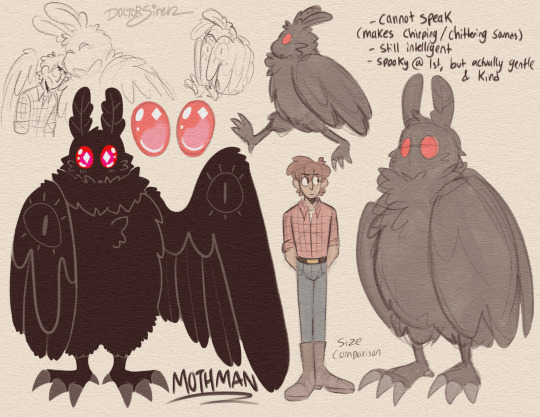

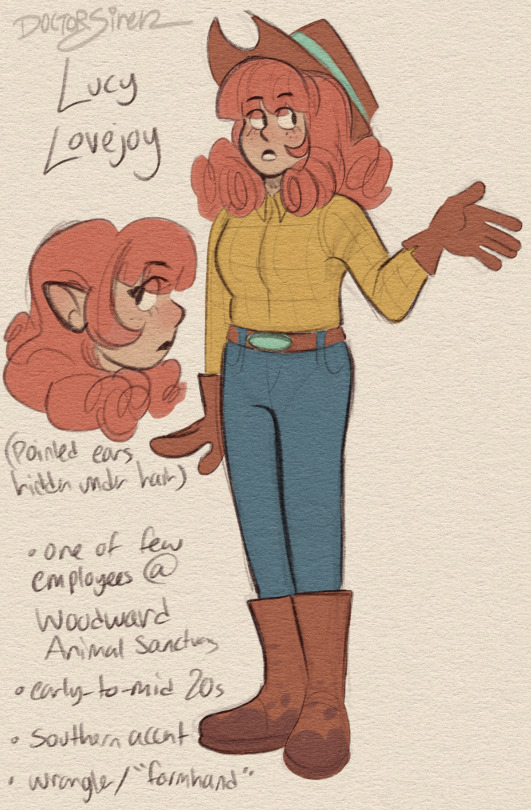
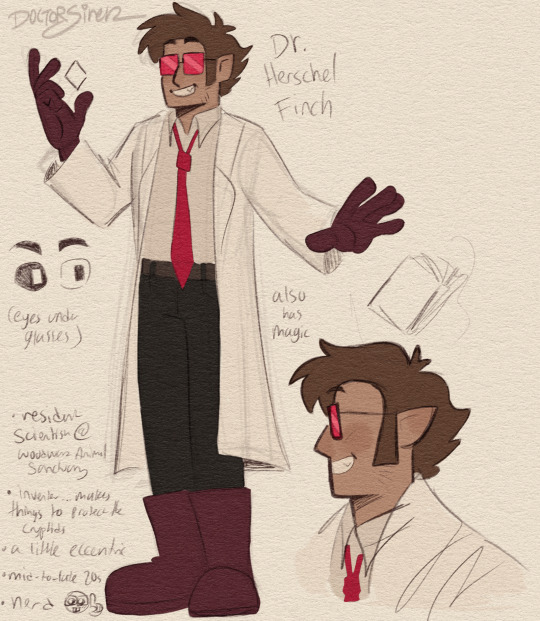
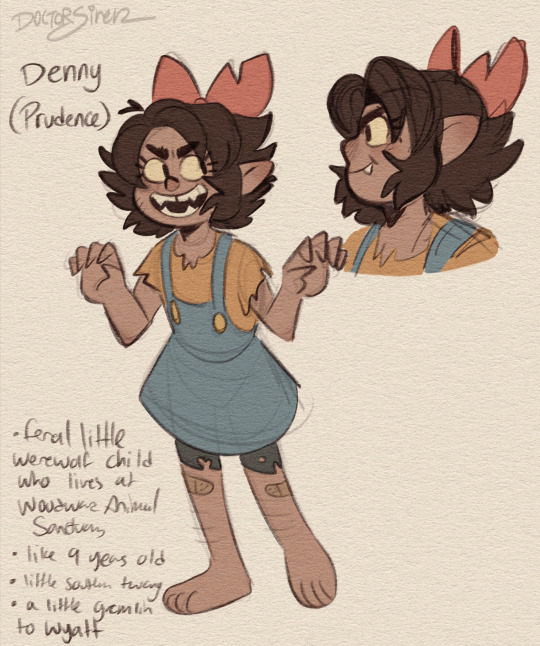
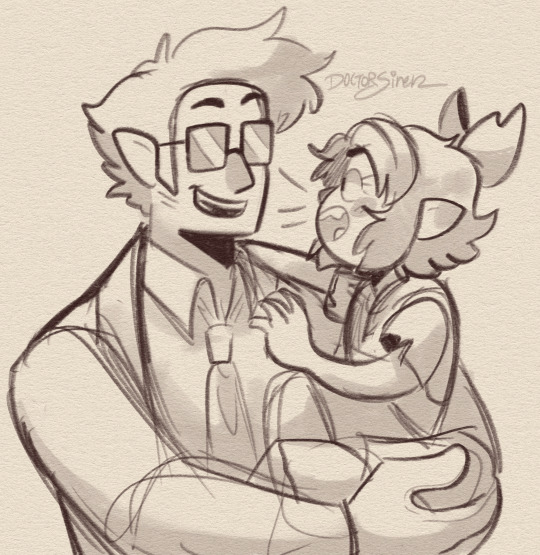
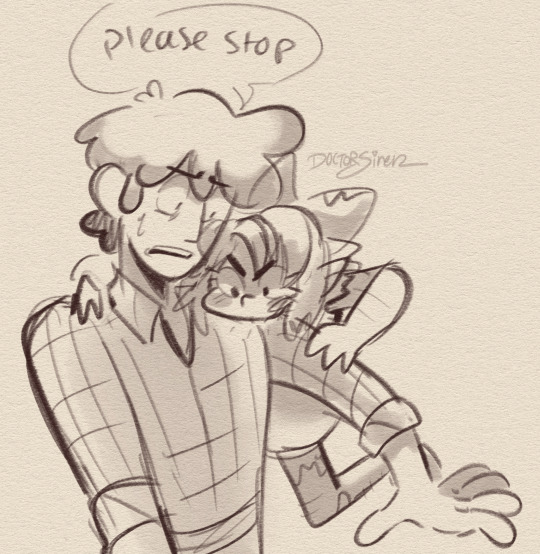
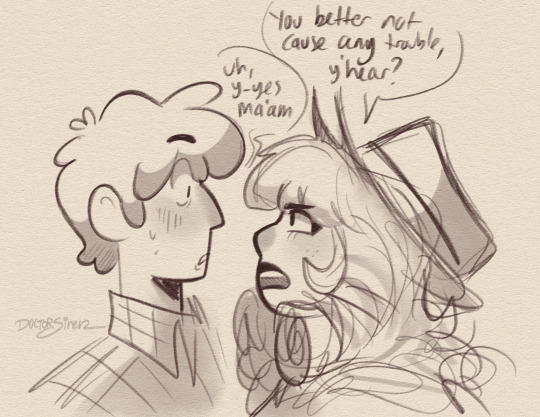
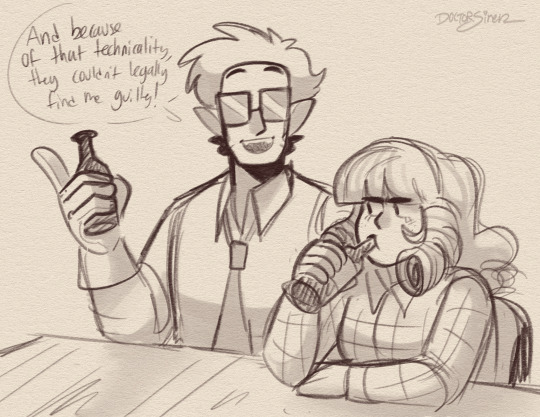
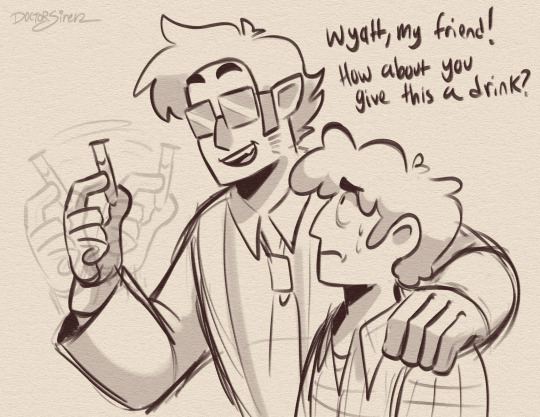
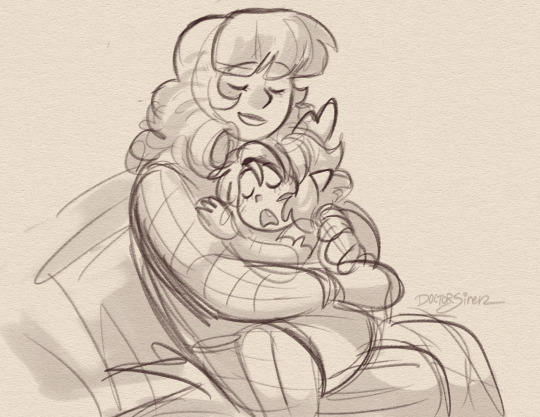
Meet the people of Woodward Ranch! To most West Virginians, the place is just a normal animal sanctuary, but to those in the know, it’s a cryptid conservation ranch :)
Wyatt Woodward is the grandson of the man who used to own the ranch (I haven’t figured out that guy yet so…). His grandfather passed and left the ranch to Wyatt in his will, despite Wyatt only having met the man once or twice when he was little. Now he’s tasked with running the place, as well as grappling with the reality that monsters, cryptids, and the supernatural are very very much real
Lucy Lovejoy is a farmhand / wrangler on the ranch. She grew up living there and is miffed that Wyatt was given ownership. She believes she’s entitled to it because she actually knows the place and Wyatt didn’t even believe in the supernatural until he came to the ranch
Dr. Herschel Finch is the ranch’s science boy (that’s probably not the official title) and he does his magic + science stuff to keep the ranch safe as well as be the resident cryptid expert. He’s very chaotic neutral and would probably kill someone…yknow…for science! Nobody really quite knows his history, despite him telling lots of strange backstories about his past.
Denny is a feral little orphan werewolf girl that lives on the ranch and has deemed it her home. She causes trouble for Wyatt because he’s easy to mess with, but she’s also the one (other than the Mothman) who sees him as family the fastest
The Mothman is one of the cryptids who regularly stays at the ranch. He was Wyatt’s grandfather’s favourite, and so Wyatt quickly becomes the new favourite of the Mothman. Just look at him 🥺 he’s so,,,🫶
Bonus:
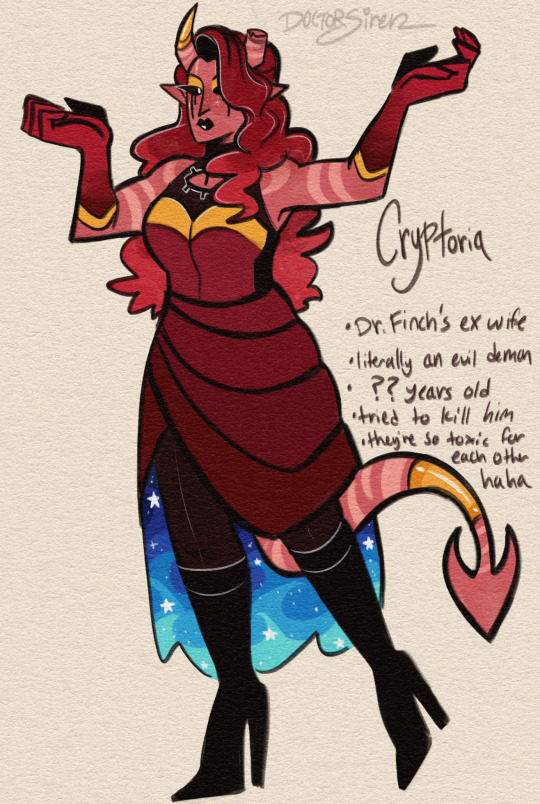
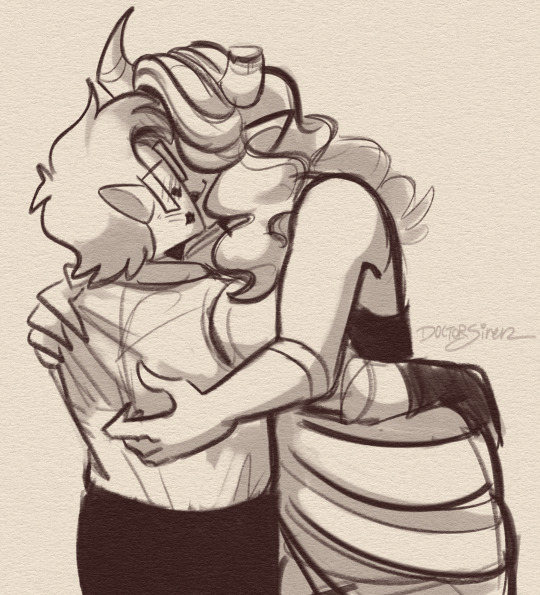
Cryptoria is Finch’s ex-wife. Nobody on the ranch has actually met her, but Finch’s reasoning for why they got divorced was that “she was evil”. They question why he didn’t take that into account when marrying a literal demon, and also why that was the dealbreaker, seeing as he’s not one to be opposed to some evil from time to time, but he doesn’t elaborate. He does explain, however, that she tried to kill him. Despite that, he also actively laments the relationship, clearly missing his hot demon wife. Cryptoria divorced HIM because she found him annoying. They’re soooo toxic for each other. They’re the kind of exes that simultaneously hate each other but would totally make out again if they had the chance.
#doctorsiren#siren’s oc#woodward ranch#mothman#wyatt woodward#lucy lovejoy#dr herschel finch#denny#cryptoria#digital art#my art#oc art#procreate#finch and cryptoria are ‘me and the bad b I lost by being autistic (i was annoying)’ /silly#wyatt and mothman are very much like hiccup and toothless I’m realizing (this was an accident)#also yes finch is my favourite type of character: square autistic nerd man 😍😍#see. he’d be the type of guy to summon bill and build the portal and then learn his true intentions but go along with them because science!!#idk what species finch and lucy are quite yet haha still workin on those#but yeah these are some rough concepts I’ve been cookin the last few days#finch fumbled cryptoria so badly dude WTF you had a hot demon lady as your WIFE and you still messed it up#…okay well she did try to kill him but he was kind of into that-#the name cryptoria literally came to me in a dream#anyways YEAH some OCs! 🫶💥
203 notes
·
View notes
Text
I’ve discovered my favorite genre of Bagginshield art is where Thorin is a lovesick idiot who is Losing It and Bilbo is unbothered or oblivious to Thorin’s suffering LMAO
#thorin oakenshield#bilbo baggins#bagginshield#if anyone has more please send it to me I have like four rn#I know I made a post a while back talking about how I wish there were more posts that focused on each of their lives outside of each other#and I still stand by that but I also can’t deny the fun in a Important Dwarf like Thorin turning into an idiot around Bilbo#tbh this works even platonically. this guy has friends bc he’s lucky not bc he’s actually friendly#so I can imagine becoming friends with Bilbo is like ‘fuck now I have to be nice bc he WILL actually leave. uh. oh god’#love men who are grouchy and offputting <3#and Bilbo is oblivious not as a flaw but bc he’s just not wired that way and he’s just accepting that Thorin is weird#bc he has no basis of which to assume he isn’t just Like That sometimes same way the dwarves don’t know shit abt hobbits#and it’s not as like. Bilbo being extremely innocent either he’s just not thinking about it LMAO#and Bilbo Also doesn’t have a ton of friends (different reasons but he IS also grouchy and petty) and he’s just ‘?? ok’#they’re both fucking stupid and everyone around them is dying and in anguish#I particularly enjoy when a character who is emotionally constipated and stoic and whatever just starts losing it#not even necessarily in a sappy or angsty way just. those emotions gotta come out eventually#so for a guy like Thorin who takes himself seriously and is very closed off emotionally it’s fun to just imagine that facade cracking#meanwhile Bilbo is just like ‘you ok??’#Bilbo himself has some emotional issues so it’s double the entertainment
256 notes
·
View notes
Text
saying this as respectfully as possible but. Do not put fandom content creators on a pedestal. We are also just fans contributing to a community just as you are. We have boundary on our own work and that’s it. What I say is not and should not be considered sth the whole fandom should listen to. I’m just a normal ass person ranting about things on my blog. If it does not have a fandom tag for others to engage in, do not make it out to be me trying to start fights or addressing the whole community. Because it’s not.
I’ve said it before and I will say it again, my art, my lore talk, is biased. I’ve never tried to hide that I view Marika a certain way and will always develop my theory following that base assumption.
Aside from translation stuffs and pointing out in-game items, everything else I say you can look at it, agree or disagree, and move on to form your own opinions. Just because I draw stuffs doesn’t mean you get to saddle me with responsibilities about managing fandom expectations. What the hell? I’m a fan artist, I’m the last person who you should look at for “leaderism” (?) WHAT?
I can and will be a hater in my own space, like I know sometimes other artists will just post their stuffs and not engage too heavily with fandom, and for a while I did try to do that here (because I’m already a dramatic ass on twitter), that’s just not me though.
You will get art and you will get my opinions as well.
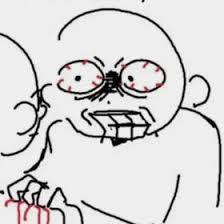
#asking ppl to [celebrate different takes] is... WHAT?#different takes as in well I think she likes apples and you think she likes grapes. yeah that’s some fun discussion to be have#but different takes as in the fundamental of a character’s drive and personality??? NO#let’s put that down very clear here#I can still read fics where Marika is cold and calculate and manipulative as long as I can see there’re layers to it and the author#set it up in a way that I can see they got her backstory and build those layers based on that#and then there are ppl who literally only portray her as omg evil girlboss 101 let’s blame everything on this cardboard character#then I click back.#and there r ppl who might not vibe with how i portray her and they can ignore me. THAT'S OK TOO. we r in our own space.#it’s as simple as that!#ever since the dlc is out i literally could see the amount of ppl blocking me go up and im just “ok” because i do go around muting ppl too.#that's normal fandom space managing experience. pls do that#lore discussion is for ppl to engage in so u say ur piece i say mine and we can continue or not depending on situation#but FANWORK? leave each other alone or be a hater in ur own space ok?#personal#also where are these ppl who have been defending Marika at... because if u exclude me#and some others i can count on one hand. where are these ppl?#ppl saying headass stuffs about the HS aren't even Marika fans or engage too much in fandom to begin with#meanwhile u can't even find one youtube lore essay that says anything good about her#ppl are even trying to give Messmer's mother position to GEQ for no goddamn reason#like where is this overwhelming support for Marika at cuz as the active Marika stan around im not seeing it
294 notes
·
View notes